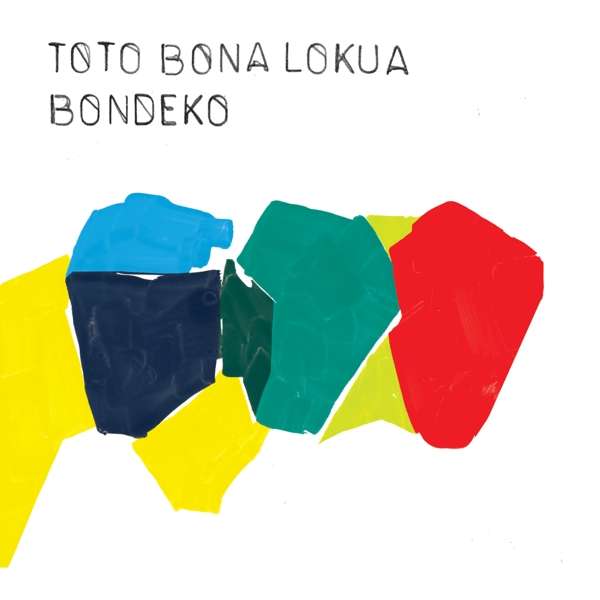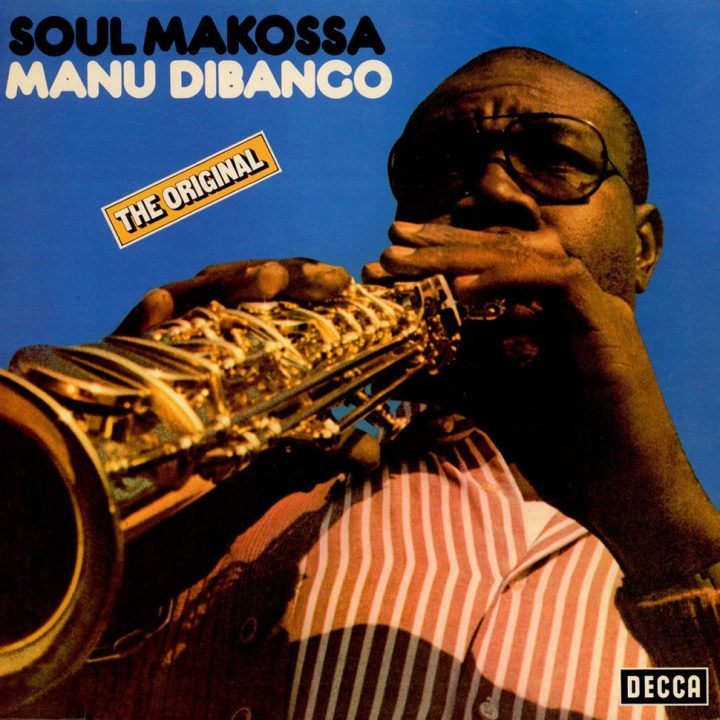“Bondeko” by Toto Bona Lokua, 2018

“Bondeko” by Toto Bona Lokua, 2018 listen here
A Band of Friends
When I was new to the field of musical anthropology, and still unexperienced in listening to ‘non-western’ music, I discovered this album in the collection of the AMA, which caught my eyes with its colourful, modernistic cover. Bondeko by Toto Bona Lokua alongside with some other records published by NoFormat! built me a gateway into intensive listening of musical traditions other than the, to me familiar, Western styles. In this Record of the Month I am going to take a closer look into this record that has caught not just my eyes but my ears.
Bondekois the second album of the pan-African trio Toto Bona Lokua founded in 2004. It is an easy and playful jazz record of three great vocalists, each being masters at their respective instrument, underlined with smooth atmospheric sounds by the producer Laurent Bizot. The Lingala title Bondeko translates to ‘friendship’ or ‘brotherliness’ and that is the overall mood of this record: a small group of friends tuning along, “a marvellous counter-position to an identarian tensions in a fragmented society”.
The group’s members are Gérald Toto, a 1967 born, Martinican rooted multi-instrumentalist, singer and composer based in Paris, Richard Bona,a New York and Paris based, 1967 born, Cameroonian jazz bassist, and LokuaKanzaa 1958 born singer and guitarist from the DR Congo living in Paris. Since the coming together of the three friends, they released two albums together and travelled a successful world tour.
Being part of the Paris underground scene in the 1990s Toto’s range is wide. His projects reach from composing raï songs for the singer and actor Faudel Belloua to being part in the electro band Smadj. Toto released his first solo album in 1998, dominated by a French-Louisiana style called Cajun music. However, he says that Sway, published in 2018, is his true debut album. He found his musical influences in “pop romance, blues, jazz, samba, eastern/mandingo melodies and Caribbean percussion”.
The offspring of a musicians’ family, with just 13 years of age, Bona performed at a French jazz club in Douala, Cameroon’s largest city. After studying in Germany, and France he came to New York, releasing his first solo album in 1999. He was nominated for two Grammy Awards and holds a Grammy for best Contemporary Jazz Album of 2002, along with several more international awards.
Lokua was part of the legendary Makossa Soul Gang lead by Manu Dibango and is playing as well as singing along other famous artists, such as Angélique Kidjo, Youssou N’Dour and Peter Maffay. He composed for Miriam Makeba and Nana Mouskouri among others. Holding several awards for his solo appearances, he has been coach to The Voice Afrique Francophone in 2016 and ‘17.
The Label presenting the trios records, No Format!,is specialised on producing ‘African Music’. Founded in 2004 by Laurent Bizot, the Paris based label today hosts such big names as Ballaké Sissoko, Vincent Segal and ALA.NI to name just three. Thibaut Mullings joint Bizot as partner in 2007. In 2004, however, the first album of the pan-African band project TotoBonaLokua has been one of the three label-founding productions. Thirteen years later they are back with another Crossover-album. Stylistically, the music is as multifaceted as the members of the band themselves. “The melodic delicacy of Gérald Toto is in keeping with Lokua Kanza’s naturally rumba-tinged style, while Richard Bona’s instrumental virtuosity and the richness of his harmonic conceptions guide the ensemble towards greater fluidity and freshness”.
Opened by birdsong, in the first track, Ma Mama, vocal harmonies lead into verses sung in each performer’s own mother tongue. The mood of the album is dominated by the unique voices, and vocal harmonies accompanied by an instrumental universe, shifting from Lokua’s dreamy guitar riffs inspired by multiple musical traditions, over soft percussions by Toto, to Bona’s virtuouso bass lines.
The album wants to be a “contrasting portrait of an Africa that is both timeless and ultra-contemporary, plural and ‘universal’, rich in the diversity of its diasporas and the multiple cultural collisions that these more or less voluntary exiles have engendered over time”. This claim seems to reflect a musical diaspora of Paris that thrives in these globalised times and expresses the kind of aesthetic mutation typical for the label that arises from the great mix of people, ideas, and forms coming together in Paris.
“Never judge a book by its cover”, they say. In this case I am overly happy about not having listened to that. I saw this eye pleasing album, took it to the record-player, tuned in, and was carried away. Now, after having learned about the pan-African background of TotoBonaLokua and having listened, following their individual trails, to most different styles of music from popular music artist from African countries and their diasporas. Bondeko guided me into musical dimensions formally unfamiliar to me. Today my playlists wouldn’t be complete without music by Richard Bona, Gérald Toto, Lokua Kanza and other artist from sub-Saharan countries and their diasporas which go into my mixes along with western-classical, jazz and electronic tunes.
Further links:
The Label:
https://www.noformat.net/index.php?lang=en
The Band:
Critiques/Reviews:
https://www.theguardian.com/music/2018/jan/14/toto-bona-lokua-bondeko-review-seamless-stuff
https://www.ft.com/content/595687ae-f414-11e7-88f7-5465a6ce1a00
https://www.jpc.de/jpcng/poprock/detail/-/art/toto-bona-lokua-bondeko/hnum/7921971
https://afropop.org/articles/bondeko

